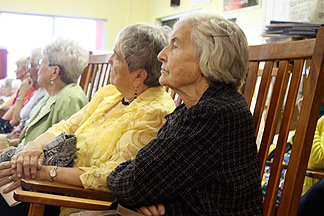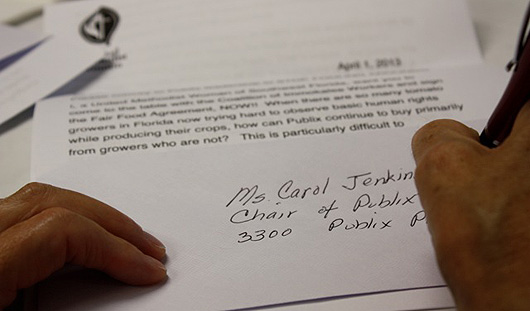141 Methodist Women visit Immokalee in wake of the march, send scorching letter to Publix Board Chair Carol Jenkins Barnett; Marchers pen own words in response to Publix’s stubborn resistance to human rights…
Though the March for Rights, Respect, and Fair Food ended just over a week ago, the momentum for Fair Food continues to build. Inspired by their time in the street with workers from Immokalee calling on Publix to respect farmworkers’ rights, many of the groups who took part in the march are taking matters into their own hands and turning up the heat in recent days.
One organization in particular, United Methodist Women — whose members marched with us, organized meals for hundreds, and read a statement of solidarity for International Women’s Day from United Methodist Women’s General Secretary/CEO Harriet Jane Olson — organized a visit to Immokalee for their mem bers from across their Southwest District this past Saturday. They came to learn about farmworker reality, about the history of farm labor exploitation in Florida and about the “New Day” of respect for farmworkers’ rights under the Fair Food Program — with a particular focus on the situation of women in the fields — and to channel their new-found knowledge into action in the Publix campaign.
bers from across their Southwest District this past Saturday. They came to learn about farmworker reality, about the history of farm labor exploitation in Florida and about the “New Day” of respect for farmworkers’ rights under the Fair Food Program — with a particular focus on the situation of women in the fields — and to channel their new-found knowledge into action in the Publix campaign.
In what may have been one of the biggest visits to the CIW Community Center to date, the delegation included 141 United Methodist Women from 26 congregations across the region. And they wasted no time in taking action, addressing letters to Carol Jenkins Barnett, the chair of the Publix Board of Directors, daughter of Publix founder George Jenkins and one of the richest people on the planet — someone who, simply by waking up tomorrow with a change of heart, has the power to change Publix’s position on the Fair Food Program.
The letter, on the occasion of April Fool’s Day, calls on Ms. Jenkins Barnett to use her power to end Publix’s policy of spreading falsehoods about the Fair Food Program, adding, “please don’t take Publix’s customers as fools.” You can read the full text below:
To Ms. Carol Jenkins Barnett, Chair of Publix’s Board of Directors:
Please convey to Publix leadership to STOP FOOLING AROUND!!!
I, a United Methodist Woman of Southwest Florida, want you to come to the table with the Coalition of Immokalee Workers and sign the Fair Food Agreement, NOW!! When there are so many tomato growers in Florida now trying hard to observe basic human rights while producing their crops, how can Publix continue to buy primarily from growers who are not? This is particularly difficult to understand in light of the fact that your father, founder George Jenkins, a staunch Methodist Church member, is deservedly famous for having said, “Don’t let making a profit stand in the way of doing the right thing.”
We call on you to help Publix find a way to join the Fair Food Program. To do that, they simply need to buy tomatoes only from farms that honor the code of conduct now in place across 90% of Florida’s tomato industry, thereby protecting harvesters’ dignity and well-being (while, incidently, improving food safety). Red Diamond and Flavor 1st, whose tomatoes we find in your stores, are among the very few growers (less than 10% of the industry) that disgracefully refuses to implement the Fair Food code of conduct. They are able to do so only because Publix continues to support their archaic practices with its purchases.
Currently, a full pound of tomatoes at Publix costs anywhere from $2 to $4, but the women and men in the fields get paid less than 2 cents for harvesting and hauling them. That’s unjust. By joining the Fair Food Program, Publix would pay its suppliers just one penny a pound more for its tomatoes, an amount we know your company can well afford given its rising profits, to help in a very small way defray the costs of the new more just agricultural approach being modeled in Florida’s fields.
Carol, please help Publix to do the “right thing,” and become part of the solution to ending the human rights injustices in agriculture.
We’ve witnessed for two years how Publix has justified its refusal to take part in the Fair Food Program by offering excuses it knows to be groundless. We call on you to direct Publix’s PR department to stop referring to the Fair Food Program as a “labor dispute.” That’s ridiculous in its insincerity. A groundbreaking collaboration among growers, retailers and farmworkers – which, for the first time ever, is cleaning up sexual harassment, wage theft, violence, lack of access to shade and water, and impoverishing wages – is as far from a labor dispute as you can get. Please don’t take Publix’s customers as fools.
Likewise, we are not fooled by Publix’s PR department continuing to say that they “will not pay employees of other companies directly for their labor” as quoted from the company website – it is disappointingly disingenuous to imply that the Fair Food Program works that way when it does not. Participating retailers like Whole Foods, Trader Joe’s, Subway and McDonald’s pay a premium in the price of their tomatoes to their suppliers. That is then passed along by the suppliers through their regular payroll systems. No buyer pays farmworkers directly for their labor, so we ask that you instruct company spokespersons to stop repeating such foolishness.
United Methodist Women, nearly one million in membership, represent a formidable purchasing demographic. We stand for justice for the poor, for the rights of immigrants, and for all human rights.
In the next week, Publix managers across southwest Florida can expect to hear from 141 Methodist Women who ask Ms. Jenkins Barnett to “please help Publix to do the ‘right thing,’ and become part of the solution to ending the human rights injustices in agriculture.”
And speaking of Publix managers… We wanted to share with you this beautiful reflection that came to us in the days following the march from marcher and long-time Campaign for Fair Food stalwart, the Rev. Bernice Powell Jackson. It is an excerpt from a message she wrote to her congregation at the First United Church of Tampa, UCC, following her participation at the Tampa vigil in support of the march (do yourself a favor and check out the incredible video from that unforgettable night before reading her words). Speaking of the Publix manager and company representatives that received the delegation from the vigil that night, she wrote:
… As they listened to the words of the woman farm worker, telling the story of the harassment and safety issues faced by those working in the fields, the managers said nothing, as they had obviously been instructed. Sylvia said to them, just as you want to be paid a decent wage for your work, so, too do we. Just as you want respect, so too do we. Still not a word or change of expression. As the rabbi told them why she was there — of her people’s history of struggle for dignity and liberation, still not a word or change of expression.
And I remembered and understood something I had heard Archbishop Tutu say long ago. He said that white South Africans were trapped by their own system and were also damaged by it. For it took away some of their humanity. The cost of being a manager in Publix means losing of your humanity.
The Immokalee workers are inviting Publix into the New Day, a day of respect and dignity and fair wages for all. A day of humanity for all.” read more >>
You can see a slightly longer, published version of Rev. Powell Jackson’s reflection here.
Finally, we close this update with words from one of the youngest marchers, Luna St. Peter, 9, who participated in the entire two-week march with her mom (Julie), dad (Bob), and little sister (Emma) from Maine. For those of you who followed the march, Luna’s smiling, full-of-life image is one of the unforgettable memories of the 200-mile journey, but here’s a picture of the whole family for those who are just tuning in today, from the rally on Day Fifteen (Luna is standing in front, wearing the CIW cap):
In poring over the thousands of pictures taken on Day Fifteen, one picture — that of a page containing the lyrics of an original song written in a child’s hand — passed under the radar on the first sweep. But a second look revealed a hidden gem — an original composition, the product of a brilliant young person’s mind processing two weeks of her life spent in the company of hundreds of people dedicated to justice, compassion, and human rights, a poem from the heart that should melt the hearts of those who, for whatever misguided reasons, have turned their backs on justice. Here below is the picture, followed by the lyrics:
Some people are bare, some don’t even care
But the people are the people and we are people too
When there’s a problem we solve it right and we work together
It might take a month, it might take a yearIt might take a month, it might take a year,
but the people are the people
Some people are mean and some people are nice
And we can change, change their hearts cuz we are people too”
Thanks, again, Luna.


